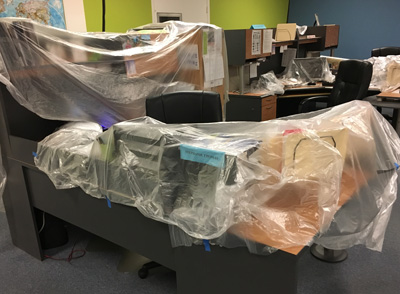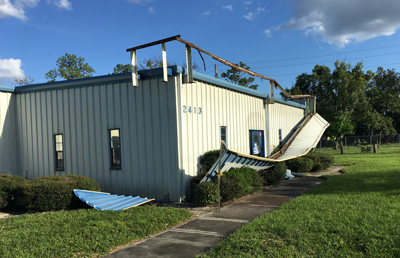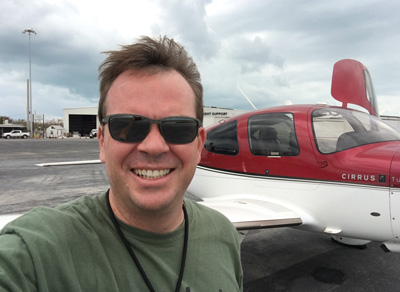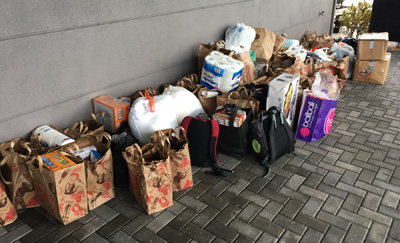Part four in a special series covering the impact of recent hurricanes on the foodservice equipment and supplies industry.
Editor’s Note: If your business was affected by Hurricanes Harvey or Irma, please reach out to FE&S’ Editorial Director Joe Carbonara via email at This email address is being protected from spambots. You need JavaScript enabled to view it.
 In preparations for Hurricane Irma, Restaurant Equipment World wrapped its desks and other equipment in plastic to protect these items from the rain and wind.
In preparations for Hurricane Irma, Restaurant Equipment World wrapped its desks and other equipment in plastic to protect these items from the rain and wind.
Given that Restaurant Equipment World and Johnson-Lancaster Associates both call Florida home, the idea of a hurricane affecting these foodservice equipment and supplies dealerships was not a new one. Accordingly, both companies had disaster plans at the ready as each prepared for the worst from Hurricane Irma, which walloped Florida earlier this month. And one dealer even found some time to help with humanitarian efforts.
Luckily the impact of the storm was not as severe as originally projected in the area surrounding Johnson-Lancaster Associates, which has its headquarters in Tampa, Fla. “We were all so very lucky and fortunate,” said Kristen Horn, who was just promoted to vice president of operations from director of procurement for Johnson-Lancaster. “We had water in the loading docks, but that’s nothing pumps could not handle.”
Johnson-Lancaster had developed its disaster plan years ago but had not put it to use. “We have been so lucky that we have not had to use it before,” Horn said. “We put up our storm shutters the Wednesday (September 6) before the storm because you could not get water or gas after that. We started letting people go once they started the mandatory evacuations.”
As part of the company’s plan, Johnson-Lancaster had everything backed up in case the dealer’s servers and other systems were down for an extended period of time. This would allow the dealer’s other offices to keep the business moving while its Florida headquarters got back on its feet. “If we got any calls or emails, we knew we could route them to our Maryland office and they could find a purchase order or shipping log to understand where a job stood,” Horn said.
With the storm gone from the area, on the afternoon of Sept. 11 Horn and Brad Lancaster, president of the dealership, and other members of the management team visited the company’s headquarters to assess the damage. “By late Tuesday afternoon we had power,” Horn said. “And by 6:45 that night we had the computers back up and running.”
Those Johnson-Lancaster employees that did have power were able to remain in contact with the company’s customers during that period when the dealer did not have power. “Our servers were down so we were not able to cut purchase orders or issue invoices but we were able answer questions when they came up,” Horn added.
Communication becomes critical for companies during times like these. First, Johnson-Lancaster checked in with the company’s Florida employees to make sure everyone made it safely through the storm. Then the company communicated when business operations would resume. “We told them that taking care of their families was their first priority,” Horn said. “But, so many people wanted to return back to work. Most of our employees were without power for a week. But we had to make sure it was safe for people to get to work, too.”
Johnson-Lancaster had closed its warehouse on Thurs., Sept. 7, cancelling all scheduled shipments for that day and Friday. “We felt if we got the shipment out, the equipment would be on a truck and it would not get to the customer,” Horn said.
As it turned out, the dealer would not be able to make any deliveries or accept shipments for four days. “By Wednesday [September 13] when we opened, there were trucks lined up ready to make deliveries to us,” Horn said. “The warehouse did a good job of receiving orders and checking them. That allowed the truckers, who had other deliveries to make, to get back on the road.”
And how did Johnson-Lancaster’s disaster plan hold up under a real life test? “We can look back now and look at the plan to see what we need to add and subtract,” Horn said. “So the plan is there but it needs some improvement. We are working on a plan so next year during hurricane season it will be bigger and better.”
Restaurant Equipment World Not Blown Away by Hurricane Irma
Damage at Restaurant Equipment World’s (REW) Orlando headquarters included some of the wind destroying some of the building’s signage and awnings and knocking down trees into the parking lot. “This building is older but it’s a tank. It held up,” said Brad Pierce, president of the Orlando-based company. REW had its sign repaired by Sept. 22, he added.  The strong winds from Hurricane Irma blew down the sign from the front of Restaurant Equipment World in Orlando.
The strong winds from Hurricane Irma blew down the sign from the front of Restaurant Equipment World in Orlando.
Despite the minimal damage, the storm was not without a few surprises. “When we came in we saw some pots and pans had fallen off the shelves and were on the showroom floor,” Pierce said. “All we could surmise was that the building was shaking.”
In the case of REW, the dealership backed up its files at three off-site locations and had one on-site backup. So the REW team went about wrapping up its desks and other equipment, moving computers to an interior room and taping the loading dock doors to prevent rain from entering the building.
The biggest disruption in productivity did not come from the actual storm, though. “It was prepping so if we needed to set up business off site a few days after the storm, we could,” Pierce said.
Anticipating a loss of power, REW entered the storm prepared. Following Hurricane Charlie in 2004, which also resulted in a massive power outage, REW bought a massive generator capable of keeping its headquarters building up and running for at least a week. “And as a result, we never lost power this time,” Pierce said. He added that power was eventually restored to the area surrounding REW on Sept. 19.
REW was closed from noon Friday through Tuesday and the company was not able to resume shipping orders until Wednesday. And during that time REW could not receive shipments, either, Pierce said. “Freight carriers were not bringing trucks down here. The only trucks getting into the area were those bringing supplies,” he added.
Pierce reports that none of the REW employees experienced significant damage to their homes. “Tree damage seems to be the biggest thing,” he said. “In my neighborhood everything seems to have turned into a single-lane road due to all of the trees falling.”
And Pierce should know, given that a tree fell on his family’s home, creating what he described as a “natural skylight.” The subsequent wind and water damage will broaden the scope of repairs, too. “It was 12 hours of non-stop, relentless rain,” Pierce said. “And that started to collapse the ceiling. It caused some pretty serious damage.”
Ironically, it was not the hurricane that hit the company’s hometown of Orlando that caused REW the most challenges. That distinction falls to Hurricane Harvey, which had hit Houston and Southeast Texas weeks before. “So many of our shipments, including those heading outside of the country, go to Houston,” Pierce said. “So Hurricane Harvey affected us because we were so busy tracking shipments and moving them around. We were not even doing any quoting during that time. So the first hurricane, the one that did not hit us, had a bigger impact.”
Mercy Flights
Like so many Floridians, Pierce and his family had evacuated given the potential danger Hurricane Irma was to bring with it. The family first moved to Atlanta before eventually riding the storm out, ironically, in New Orleans — a city devastated by Hurricane Katrina in 2005.
 Restaurant Equipment World’s Brad Pierce prepares to participate in a mercy flight providing humanitarian aid to people in the Florida Keys. Pierce belongs to a nonprofit organization known as Angel Flight –Southeast.In addition to being president of REW and a past president for the Foodservice Equipment Distributors Association, Pierce is a pilot and a member of Angel Flight — Southeast. This is a nonprofit organization comprised of other pilots who use their planes and abilities to help those in need.
Restaurant Equipment World’s Brad Pierce prepares to participate in a mercy flight providing humanitarian aid to people in the Florida Keys. Pierce belongs to a nonprofit organization known as Angel Flight –Southeast.In addition to being president of REW and a past president for the Foodservice Equipment Distributors Association, Pierce is a pilot and a member of Angel Flight — Southeast. This is a nonprofit organization comprised of other pilots who use their planes and abilities to help those in need.
“My plan was to be running medical flights and Angel Flights on Tuesday morning as a first response,” Pierce said. “Our mission is to be first responders to move people out of affected areas. That was less than anticipated because our governor, Rick Scott, did a great job of staging people where they needed to be.”
On Sept. 16, Pierce and his fellow members of Angel Flight Southeast were cleared by the government to begin flying Homeland Security Emergency Air Transport System (HSEATS) missions to provide humanitarian aid in the form of delivering supplies from the Tampa area to the Florida Keys.
By noon on Sept. 16, 20 airplanes had delivered 11,000 pounds of supplies to the area, Pierce said. This included medical supplies, food, portable stoves — you name it. “The disaster relief organizations were picking up the shipments as fast as we could get them in,” Pierce recalled. “It was absolutely amazing.”  Pilots like Restaurant Equipment World’s Brad Pierce flew a variety of supplies, including food and medicine, to help people in the Florida Keys.
Pilots like Restaurant Equipment World’s Brad Pierce flew a variety of supplies, including food and medicine, to help people in the Florida Keys.
As of now, Angel Flight’s operations to the Florida Keys have concluded. “The military and the government can do a much better job than we can longer-term,” Pierce said. “We are a bridge. From the second we can get in there we will hold you over by providing you with what you need until the government can take over.”
All told, more than 500 flights delivered 250,000 pounds of much-needed supplies to people on the Florida Keys during such dire times. These totals include contributions made by a variety of other nonprofit organizations similar to Angel Flight Southeast.
“People flew down from New York, Pennsylvania and other areas to help,” Pierce said. “I am proud to be part of a group of people who all raise their hands to help those that need it. Plenty of the people making these flights had damage as well. We just were not as bad as they were. This helps you understand the difference between something that’s an inconvenience and a problem.”
And now? Angel Flight Southeast and other groups have turned their attention to the U.S. Virgin Islands, Puerto Rico and other areas affected by Hurricane Maria. As for Pierce, well, he’s working on trying to get his new skylight turned back into a roof.
That’s the thing about natural disasters: they may come and go in relatively short amounts of time but the mess they leave behind can take weeks, or even years, to address. “When a natural disaster hits, people in other parts of the world are aloof to it,” Pierce said. “It does not affect their lives or expectations. They still want to know where their shipment is.”
Usually, though, when someone explains their situation, people in the foodservice industry can be pretty understanding and supportive, Horn and Pierce agreed.
“A lot of people don’t understand you are in Florida,” Horn said. “Some manufacturers were asking for revised purchase orders and other information. I would say hey, we are behind but give us some time and we will get back up and running. And people were understanding.”
Despite the challenges they, along with their coworkers and customers, have endured in recent weeks, both Horn and Pierce continue to count their blessings. “We can’t even compare it to what the people in South Florida went through,” Horn said. “We are very fortunate.”



